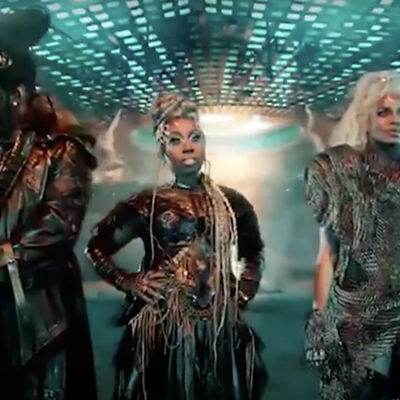Coming out of the suburbs of London in 1963, the quintessentially English Yardbirds had one of the more interesting career trajectories of bands in terms of sound.
They hatched as a mostly hardcore blues-based group, specializing in covers like “Good Morning, Little Schoolgirl,” “Got Love If You Want It” and “Train Kept a’-Rollin’.” But the band later found their greatest commercial success with more rock- and psychedelic-leaning numbers like “For Your Love,” “Heart Full of Soul,” “Shapes of Things” and “Over Under Sideways Down.”
Of course, the band was also an amazing incubator for guitar heroes, having the Holy Trinity of Eric Clapton, Jeff Beck and Jimmy Page pass through their ranks (not so lucky was original member Anthony “Top” Topham). The rest of the group included Keith Relf (vocals/harmonica), Chris Dreja (rhythm guitar), Paul Samwell-Smith (bass through 1966) and Jim McCarty (drums).
They called it quits in 1968, with only Page left and briefly fronting “The New Yardbirds” before changing that name to...Led Zeppelin. In 1976, Relf was electrocuted and died while playing guitar in his basement, while some members reunited from 1982 to 83. The group has been back full-time since 1992, so what’s the biggest difference between the Yardbirds of yore and the flock in 2016?
“Well…they’re all American now. And they’re younger!” laughs a 72-year-old Jim McCarty, now the sole original member left. “But we did a tour last fall that worked really well. And this lineup has a lot of experience; they’ve all grown up with the music, so it’s sort of in their blood.”
The lineup includes several crack players who have also performed with other big names, including guitarist Johnny A (Peter Wolf), bassist Kenny Aaronson (Bob Dylan, Billy Idol), singer/harmonica player Myke Scavone (Ram Jam) and guitarist/singer John Idan.
When the Yardbirds were starting out, they, like their contemporaries in the Beatles, Rolling Stones, The Who, Kinks, Animals and Zombies, fell under the spell of American blues artists. In addition to their own originals, a large chunk of their set list included cover tunes by Muddy Waters, Howlin’ Wolf, Elmore James and Sonny Boy Williamson.
McCarty says it’s easy to figure out why that particular music didn’t have anything near the impact on U.S. teens as it did the young lads Across the Pond.
“Most of that music was on a black circuit, wasn’t it?" he offers. "Those performers played to black audiences, and not really white kids in the U.S. They really didn’t know about it until the Stones and the Kinks started playing those songs. And you really just had like a half a dozen U.S. albums that all [us] bands got their material from, like Howlin’ Wolf and Slim Harpo and Chuck Berry.”
A fan of more rock-oriented artists such as Buddy Holly and Johnny Cash, McCarty nonetheless grew to love the “bluesier stuff,” which he says added elements of soul and raw emotion. “And when that music started coming over to England in the early ‘60s, it was kind of underground,” he recalls. “You wouldn't hear it on the radio; you’d have to go to a particular record shop to find it.”
Musicians would also trade notes in person – often during late-night bull sessions at London clubs like the Bag O’Nails, the Marquee and Ronnie Scott’s Jazz Club. It wasn’t uncommon to find members of top groups drinking, mingling and with an eye out for a different sort of bird.
“You’d meet in a late club because that’s the only time you weren’t working, though not all of us lived in the city,” McCarty says. “I’d go to the Speakeasy and Bag O’Nails and Cromwellian, and you’d see John Lennon or Keith Moon or some of the Kinks. Or you’d see them on the motorway stops along the way for a cup of tea or something!”
As the man who kept the beat behind three of rock’s best-known axe men, McCarty had ample opportunity to observe their very different approaches to recording and performing.
“Of course, they were all great. As for playing with me, I supposed that Jeff was the most off-the-wall, the most spontaneous. You never knew how he was going to play. He might have a great night one night and a bad one the next, depending on what mood he was in!” McCarty laughs.
“The other two were much more stable," he continues. "Jimmy was used to playing on sessions for people, so he was very professional. And Eric was just learning how to play, really, to play great blues. He was a purist [at that time], and he really wasn’t going to expand himself.”
And as to the rock legend that Clapton played only begrudgingly on the more pop-oriented “For Your Love” – then promptly quit the band when it became their first hit?
“Yes, that’s true. But a blues song wasn’t going to put us [on the charts],” he says. “And there were also various politics in the band. Eric and Paul really didn’t get on, which was a bit of a problem.”
In 1992, the same year that the Yardbirds started up again, the group (minus Topham) was inducted into the Rock and Roll Hall of Fame, with U2’s The Edge handling the induction honors.
McCarty recalls a “wonderful, great evening,” topped by the fact that he got to meet boyhood idol Johnny Cash.
Today, the Yardbirds are busy with summer and fall U.S. tours — along with a stint of dates in Japan. McCarty is also working on a solo record (the band's last effort was 2003’s Birdland), and writing his autobiography. He says that he still keeps in touch with Chris Dreja, who left the lineup for good in 2013 because of health reasons. “He seems okay; he’s getting by, but taking things slow," notes McCarty. "But he can’t really play or get around too much.”
McCarty does mention that the pair did share an interesting memory of touring Texas in the 1960s, one that nearly took them to the center of a important American historical event.
“We were in a limo coming from the airport with the promoter, and he asked us if we wanted to see the place where Kennedy was shot. It was the first thing he said!” McCarty laughs. “That spooked us a bit, so we said, ‘No, just take us to the hotel!”
Find out more about the Yardbirds at theyardbirds.com.
Support Us
Houston's independent source of
local news and culture
account
- Welcome,
Insider - Login
- My Account
- My Newsletters
- Contribute
- Contact Us
- Sign out
[
{
"name": "Related Stories / Support Us Combo",
"component": "11591218",
"insertPoint": "4",
"requiredCountToDisplay": "4"
},{
"name": "Air - Billboard - Inline Content",
"component": "11591214",
"insertPoint": "2/3",
"requiredCountToDisplay": "7"
},{
"name": "R1 - Beta - Mobile Only",
"component": "12287027",
"insertPoint": "8",
"requiredCountToDisplay": "8"
},{
"name": "Air - MediumRectangle - Inline Content - Mobile Display Size 2",
"component": "11591215",
"insertPoint": "12",
"requiredCountToDisplay": "12"
},{
"name": "Air - MediumRectangle - Inline Content - Mobile Display Size 2",
"component": "11591215",
"insertPoint": "4th",
"startingPoint": "16",
"requiredCountToDisplay": "12"
}
,{
"name": "RevContent - In Article",
"component": "12527128",
"insertPoint": "3/5",
"requiredCountToDisplay": "5"
}
]
KEEP THE HOUSTON PRESS FREE...
Since we started the Houston Press, it has been defined as the free, independent voice of Houston, and we'd like to keep it that way. With local media under siege, it's more important than ever for us to rally support behind funding our local journalism. You can help by participating in our "I Support" program, allowing us to keep offering readers access to our incisive coverage of local news, food and culture with no paywalls.
Bob Ruggiero has been writing about music, books, visual arts and entertainment for the Houston Press since 1997, with an emphasis on classic rock. He used to have an incredible and luxurious mullet in college as well. He is the author of the band biography Slippin’ Out of Darkness: The Story of WAR.
Contact:
Bob Ruggiero
Trending Music
- Top 10 Butt-Rock Bands of All Time
- The Marías Go Deep in Concert
- Houston Concert Watch 7/24: Zach Bryan, Koe Wetzel and More
-
Sponsored Content From: [%sponsoredBy%]
[%title%]

Don't Miss Out
SIGN UP for the latest
Music
news, free stuff and more!
Become a member to support the independent voice of Houston
and help keep the future of the Houston Press FREE
Use of this website constitutes acceptance of our
terms of use,
our cookies policy, and our
privacy policy
The Houston Press may earn a portion of sales from products & services purchased through links on our site from our
affiliate partners.
©2024
Houston Press, LP. All rights reserved.





